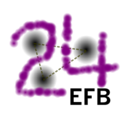Few-nucleon scattering offers good opportunities to investigate dynamical aspects of the three-nucleon forces (3NFs), such as momentum, spin, and iso-spin dependencies. The nucleon-deuteron scattering at intermediate energies ($E/A \sim 100~\rm MeV$) has provided a solid basis to nail down detailed properties of 3NFs [1.], however, the total isospin channel of the 3NFs is limited to ${\it T...
Andrzej Wilczek for the BINA collaboration between
Institute of Physics, Jagiellonian University, PL-30348 Krakow, Poland
Institute of Nuclear Physics, PAS, PL-31342 Krakow, Poland
KVI-CART, University of Groningen, NL-9747 AA Groningen, The Netherlands
Institute of Physics, University of Silesia, PL-41500 Chorzow, Poland
Faculty of Physics University of Warsaw, PL-02093 Warsaw, Poland
The...
For the BINA collaboration between
Faculty of Physics University of Warsaw, PL-02-093 Warsaw, Poland
Kernfysisch Versneller Instituut, NL-9747 AA Groningen, The Netherlands
Institute of Physics, Jagiellonian University, PL-30059 Kraków, Poland
Institute of Nuclear Physics PAS, PL-31342 Kraków, Poland
Institute of Physics, University of Silesia, PL-40007 Katowice, Poland
Experimental studies...
Studies of few-nucleon system dynamics is the basis for understanding of nuclear interactions and properties of nuclei.
The very accurate theoretical calculations for three nucleon systems should be confronted with a rich set of systematic experimental data. For this purpose a series of measurements of deuteron breakup in collision with proton was conducted in KVI Groningen and FZ-Julich....
Few-nucleon systems are the basic laboratories for studying the mechanisms of interactions between nucleons. In three-nucleon systems, at intermediate energy, below the pion production threshold, the effects of three-nucleon forces (3NF) are generally small and hard for experimental study. To take a step forward into larger system, a four-nucleon (4N) were studied, where sensitivity to the 3NF...

